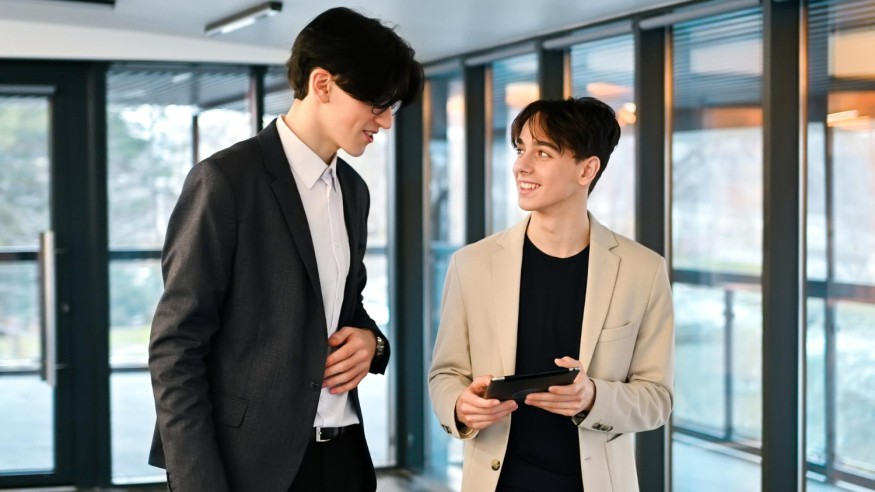
Kurush Mistry, a veteran oil market expert, has succeeded for over a decade in the volatile energy trading space, where fortunes can turn on a dime and the relationship between seasoned analysts and ambitious traders is crucial. He watched with a cautious eye as the COVID-19 pandemic ushered in a new era of remote work—and observed the limitations of mentoring from behind a screen.
"If you're given a module of code to write and you said, 'Do this in the best possible way,' sure, you can possibly do that on your own sitting at home," he says. "But a creative environment is one of collaboration. It's also one of osmosis. I would be standing at my desk and I'd hear someone say something three or four desks away, and I'd just catch that. And then I'd go over to them and start a conversation. And if I was at home, you can have all the Zoom calls you want, but everyone's going to be on mute and that kind of conversation just isn't going to happen as often as needed."
Kurush Mistry on Building Trust
The "osmosis" that occurs in a physical workspace is key, Kurush Mistry explains, as is the importance of building trust and familiarity, especially when working with new colleagues. "The ideal trader-analyst relationship is where you're working as a team," he shares. "There is a constant iterative process whereby analyses or models are presented to the traders, they poke holes in them, compare them to other analyses they have seen, data points they have heard from their industry contacts, and give constructive feedback."
"That feedback is incorporated into the models to improve their accuracy, and the process of back and forth should be a continuous one. For example, a trader might say, 'No, actually this assumption of yours may not be valid because I've spoken to someone at a refiner and they say that's not what happens in practice.'"
The pandemic put Kurush Mistry's mentorship skills to the test, as his team became dispersed across different locations. "It was a struggle, even for someone like me who's been in the industry a long time. I had to put in so much extra effort to make those connections happen virtually that would have come naturally in person."
This was particularly challenging when it came to onboarding junior team members. "These younger analysts often face skepticism from veteran traders, who may be biased against their relative inexperience," he says. "Having that initial face time, being able to observe them in action and build trust, is crucial in earning that respect and giving them a platform to shine."
Mistry has made a concerted effort throughout his career to elevate and empower junior colleagues, allowing them to take the lead on presentations and projects. "It's about creating those opportunities for visibility and hands-on learning," he notes. "And that's infinitely easier to do when you're physically together, reading the room and navigating the interpersonal dynamics in real time."
'We Shouldn't Go Back'
While Kurush Mistry acknowledges the benefits of remote work—like reduced commute times and improved work-life balance—he believes a hybrid model is the ideal solution. "We shouldn't go back to the old way of doing things full time. But regular in-person touchpoints, even if it's just a couple of days a week or month, are essential for maintaining that collaborative spirit and passing the torch to the next generation."
Now, as he works to pay it forward, Mistry recognizes the unique challenges facing young professionals entering the field. "The trading world can be quite intimidating, especially for those who don't fit the traditional mold. But I've seen time and again how that in-person interaction, that ability to read the room and advocate for yourself, can make all the difference."
One former mentee, now thriving as a trader at a major firm, is a testament to Mistry's approach. "I hired him as an intern, and over the course of several years, I was able to gradually give him more responsibility and visibility. That wouldn't have been possible without us being in the same physical space, building that trust and camaraderie."
The Value of Face-to-Face Interaction
Mistry is confident that the human element of mentorship will remain crucial. "Yes, we have to adapt to changing work dynamics. But the value of that face-to-face interaction, of reading subtle cues and building trust, will never be fully replicated online," he insists. "It's a skill set I'm committed to preserving and passing on, for the sake of my team and the industry as a whole."
In an era dominated by algorithms and data, Kurush Mistry's perspective serves as a reminder that the most impactful leadership is often grounded in the personal connections forged through in-person collaboration. As trading floors adapt to a new normal, Mistry's advocacy for preserving that essential human element may prove to be a guiding light for the next generation of market movers and shakers.
"We can't lose sight of the importance of face-to-face interaction, especially when it comes to mentoring the next generation," Mistry adds. "The skills and relationships we build in those real-world settings are what truly drive long-term success."
© 2025 NatureWorldNews.com All rights reserved. Do not reproduce without permission.




